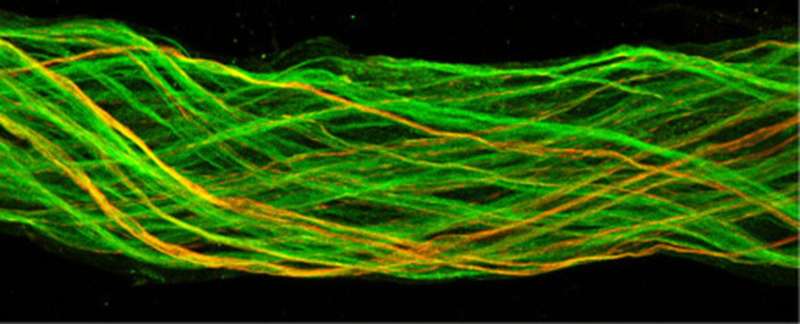Elimination of specific neurons outside the brain triggers obesity

A research team led by Ana Domingos, from Instituto Gulbenkian de Ciencia (IGC; Portugal) has developed a new genetic technique that eliminates specific neurons of the peripheral nervous system without affecting the brain. Using this novel technique in mice, the researchers studied the function of the neurons that innervate the adipose tissue, and saw that their elimination results in mice gaining weight very quickly. Published on April 3 in Nature Communications, this technique opens new avenues for the study of many diseases related to the peripheral nervous system and to other cells outside the brain.
Interested in studying the neurobiological mechanisms underlying obesity, Domingos' laboratory had recently discovered a set of neurons that innervate the adipose tissue, and demonstrated that the direct activation of those neurons burned fat. The team then wanted to see if mice gained weight in the absence of these same peripheral neurons. Domingos' team sought ways to pinpoint the neurons of interest without affecting similar neurons that also exist in the brain.
To achieve this, Domingos' laboratory collaborated with the chemist Gonçalo Bernardes at Instituto de Medicina Molecular (IMM, Portugal) and Cambridge University to develop a novel technique. The research team modified a widely used molecular tool based on the use of diphtheria toxin. This toxin only kills cells that contain its receptor, which was artificially introduced to the specific cells the researchers wanted to study. The team genetically introduced the diphtheria toxin receptor in the fat-innervating neurons of mice, which would then render neurons susceptible to the deadly action of the toxin. However, the genetic engineering also placed the diphtheria toxin receptor in other neurons in the brain that the researchers did not want to ablate. "The problem is that diphtheria toxin can cross the blood-brain barrier. Therefore, we could not use this molecular tool to eliminate peripheral neurons without affecting similar neurons that also exist in the brain," explains Ana Domingos.
To solve this problem, the research team decided to chemically modify the diphtheria toxin, increasing its size, thereby limiting its access to the brain. "Big molecules tend not to enter the brain, so we made the toxin bigger," says Ana Domingos.
Ines Mahu, Ph.D. student in Domingos' laboratory and author of this study, describes their results: "We were able to eliminate neurons from the adipose tissue of mice, without affecting the brain. When comparing mice with or without those peripheral neurons, we observed a similar eating behavior. However, mice that lacked the sympathetic neurons became fat very quickly." "We've never seen animals getting fat so quickly," says Mafalda Pereira, the lead author of this study.
"This new technique allowed us to verify the importance of the neurons that innervate the adipose tissue to maintain a normal adiposity. But most importantly, it overcomes possible side effects in the brain that could result from the limitations of the previous technique. We can now perform genetic ablation outside the brain, and study the function of many peripheral cells not only for obesity but for several other diseases," highlights Ana Domingos.
More information: Nature Communications, DOI: 10.1038/NCOMMS14967


















